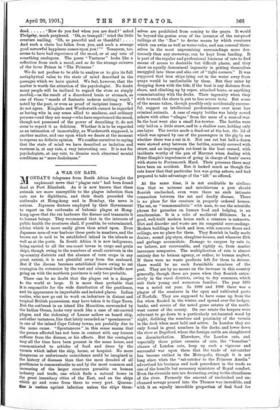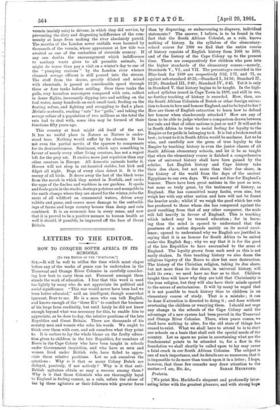A. WAR ON RATS.
MONDAY'S telegrams from South Africa brought the unpleasant news that " plague rats " had been found dead at Port Elizabeth. As it is now known that these animals are more susceptible to the plague infection than cats are to diphtheria, and their death preceded the outbreaks at Hong-kong and in Bombay. the news is serious. Japanese doctors employed by their Government to report on the outbreaks of bubonic plague at Hong- kong agree that the rat harbours the disease and transmits it to human beings. They recommend that in the interests of public health the creatures shall, if possible, be exterminated, advice which is more easily given than acted upon. Even Japanese men-of-war harbour these pests in numbers, and the brown rat is said to be established inland in the islands as well as at the ports. In South Africa it is now indigenous, being carried to all the sea-coast towns in cargo and grain ships, though owing to the numbers of small carnivora in the up-country districts and the absence of corn crops in any great extent, it is not plentiful away from the seaboard. But if the disease becomes established there owing to rat contagion its extension by the vast and abnormal traffic now going on with the northern provinces is only too probable.
There can be no doubt that the plague rat is a danger to the world at large. It is more than probable that it is responsible for the wide distribution of the pestilence, and its appearance in improbable and isolated places Indian coolies, who now go out to work on indenture in distant and tropical British possessions, may have taken it to Cape Town. But the outbreak in an island like Mauritius, surrounded by the Indian Ocean, looks very much like a case of rat-carried plague, and the sickening of Lascar sailors on board ship, and other instances, like that lately recorded as " spontaneous" in one of the inland Cape Colony towns, are probably due to the same cause. "Spontaneous" in this sense means that the person affected has not been in contact with any human sufferer from the disease, or his effects. But the contagion May all the time have been present in the same house, and communicated to articles of food and dress by the vermin which infest the ship, house, or hospital. No more dangerous or unfortunate coincidence could be imagined in the history of diseases than that the most dreaded of all pesttlences is communicable to and by the most common and increasing of the larger creatures parasitic on human industry and trade, one which finds a natural home in the great insanitary cities of the East, and on the ships which go and come from there to every port. Quaran- tine is useless against infection unless the ships them- selves are prohibited from coming to the quays. It would be beyond the genius even of the inventor of the rat-proof railings at the " Zoo" to devise means by which creatures which can swim as well as water-voles, and can conceal them- selves in the moat unpromising surroundings more dex- terously than any stowaway, can be kept from landing. It is part of the regular and professional business of rats to find means of access to desirable but difficult places, and they show an equally demoniacal ingenuity in getting themselves smuggled into these and also out of " tight corners." It was supposed that iron ships lying out in the water away from quays would be unclimbable by them. But they enter by dropping down with the tide, if the boat is any distance from shore, and climbing up by ropes, attached boats, or anything communicating with the decks. Their ingenuity when they wish to reach the shore is put to less severe tests. But some of the means taken, though possibly only accidentally success- ful, suggest an intellectual predominance over most less criminal animals. A case of empty bottles was lately rowed ashore with other " ullages " from the mess of a man-of-war. In the boat went also a small fox-terrier. The bottles were only laid on a little straw, and in a shallow case, holding only one layer. The terrier made a dead-set at the box, the lid of which was opened by one of the passengers in the gig to see whether there was a rat in it. Not one rat but half-a-dozen were stowed away between the bottles, scarcely covered with straw, and an impromptu rat-hunt in the boat ensued, with incidents worthy of the pen of Marryat when dealing with Peter Simple's 'experiences of going in charge of boats' crews with stores to Portsmouth Hard. Their presence there may have been an accident. But it looked much as though the rats knew that that particular box was going ashore, and had prepared to take advantage of the " lift " so offered.
At the same time, it is not creditable to civilisa- tion that so noisome and mischievous a pest should flourish unchecked, even were there no such intimate connection between the rat and deadly disease. There is no place for the creature in properly ordered houses. The rat, as " commensalistic " with man, to use the scientific phrase for parasites on human food and lodging, is an anachronism. It is a relic of medieval filthiness. In a good, well-built modern house such a creature is unknown. Dirt and disorder and waste are its congenial surroundings. Modern buildings in brick and iron, with concrete floors and ceilings, are no place for them. They flourish in badly made drains ; round pig-styes, slaughter-houses, and wherever filth and garbage accumulate. Damage to cargoes by rats is, we believe, not recoverable, and rightly so, from marine insurance companies. The multiplication of rats is almost entirely due to human agency, or rather, to human neglect. If there were no waste products left for them to devour, there would be no such formidable numbers of the pest. They are by no means on the increase in this country generally, though there are years when they flourish exten- sively in the rural districts, owing to dry summers, which suit their young and numerous families. The year 1895 was a noted rat year. In 1898 and 1899 there was a plague of the creatures in the open and cultivated parts of Norfolk. They are supposed to have come up from the fen when flooded in the winter, and spread over the hedges, banks, and covers of the noted game estates of the north- west corner of the county. On one estate the keepers were reluctant to go down to a particularly rat-haunted wood by night, disliking the numbers and proximity of the vermin in the dark when most bold and active. In London they are only found in great numbers in the docks, and lower down the river at Deptford, where the foreign cattle are slaughtered on disembarkation. Elsewhere, the London cats, and especially those prime enemies of rats, the "homeless" classes of London cats, keep up such a vigorous and successful war upon them that the trade of rat-catcher has become extinct in the Metropolis, though it is not long since when the "rat-catcher to the Princess Amelia" advertised his business and took precedence in the trade as one of the humble but necessary ministers of Royal comfort. Even the riverside rats 'are decreasing, owing to the cleanliness of the river. Formerly the amount of unchecked and un- cleansed sewage poured into the Thames was incredible, and with it an equally incredible proportion of foul food for
vermin (mainly rats) to devour, in which they did service, by preventing the dirty and disgusting indifference of the com- munity at large from making the river absolutely putrid. The mouths of the London sewer outfalls were haunted by thousands of the vermin, whose appearance at low tide was awaited as one of the curiosities of riverside scenery. If any one doubts the encouragement which indifference to sanitary waste gives to all parasitic animals, he might do worse than pay a visit on a winter's day to one of the " pumping stations " by the London river whence cleansed sewage effluent is still poured into the stream. The stuff from the drains, greatly diluted and mixed with chemicals, is passed at considerable speed through three or four tanks before settling. Over these tanks the gulls, very harmless scavengers compared with rats, collect in dense flights, incessantly dipping into and settling on the foul water, many hundreds on each small tank, feeding on the floating refuse, and fighting and struggling to find a place. Mutalis mutandie, reading "rats" for "gulls," and taking the sewage refuse of a population of two millions as the total the rats had to deal with, some idea may be formed of their functions fifty years ago.
This country at least might rid itself of the rat. It has no useful place in Nature as Nature is under- stood here. Nothing would suffer by its absence. It has not even the partial merits of the sparrow to compensate for its destructiveness. Sentiment, which says something in favour of nearly every other living creature, has not a regret left for the grey rat. It excites more just repulsion than any other creature in Europe. All domestic animals loathe it. Horses will not sleep in rat-haunted stables, but kick and fidget all night. Dogs of every class detest it. It is the enemy of all birds. It drove away the last of the black terns from the marsh in which they nested in Norfolk, and sucks the eggs of the finches and warblers in our gardens. It spoils and fouls grain in the stacks, destroys potatoes and mangolds in the earth clamps where they are stored for the winter, robs the nests of all wildfowl on ornamental waters, drives away rabbits and game, and causes more damage to the outbuild- ings of farms and large country houses than damp and rain combined. It is an economic loss in every sense, and now that it is proved to be a positive menace to human health as well it should, if possible, be improved off the face of Great Britain.







































 Previous page
Previous page